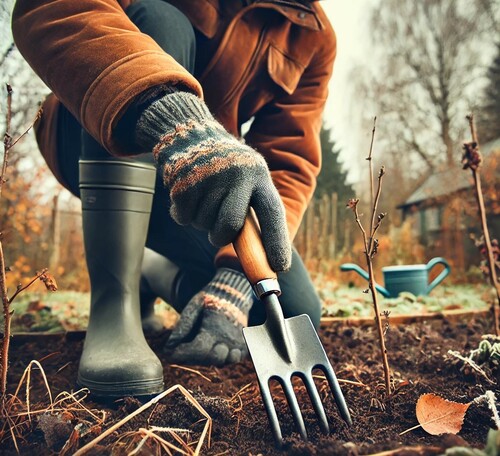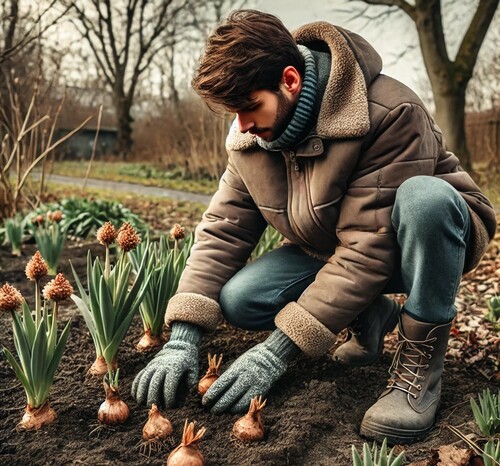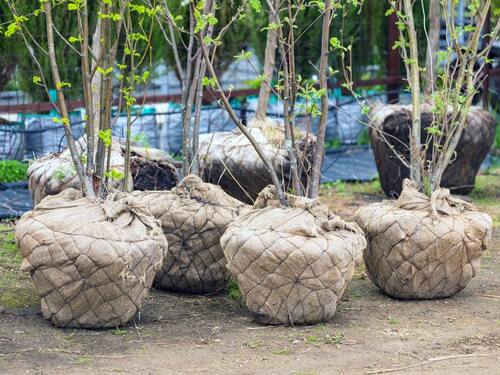Prepping Your Garden for Winter
Introduction
As fall settles in and the garden’s activity slows down, it might be tempting to let nature take its course. After all, you’ve done the hard work in spring and enjoyed the summer’s bounty. But what if we told you that a little extra effort now could save you time and enhance your garden’s health next spring ? Preparing your garden for winter not only minimizes the workload for the coming year but also helps create a more vibrant and productive garden.
Clean Up Rotting and Spent Plants

A Gardener Weeding in a Late Autumn Garden Using a Hand Tool
Old, rotting plants are not only unsightly but can also harbor diseases, pests, and fungi that may threaten next year’s garden. Insects feeding on these plants may lay eggs on the stalks and leaves, giving pests a head start in spring. Remove these spent plants or bury them in garden trenches if they are disease-free. Burying old plants adds organic matter to your soil, improving its health and fertility.
Remove Invasive Weeds
Invasive weeds can survive winter and return with a vengeance in spring. Simply shifting them to another part of the garden won’t do—complete removal is the only way to prevent them from sprouting again. Take the time now to thoroughly weed your garden and reduce the chances of fighting a weed invasion next season.
Prepare Your Soil for Spring
Fall is an excellent time to amend your soil with nutrients that will benefit your plants come spring. Consider adding organic materials like compost, manure, bone meal, kelp, and rock phosphate. By turning or digging the soil now, you’ll reduce the workload in spring and give your garden a head start.
Divide and Plant Bulbs

A Gardener Planting Bulbs in a Late Fall Garden
Spring bulbs may have long since bloomed and died back, but fall is the time to divide and plant bulbs that appeared crowded or straggly during the growing season. Dig 4-8 inches away from the plant’s stalk, loosen the soil, and gently lift the bulbs. Separate the bulblets and transplant them elsewhere in the garden. If you previously dug up your spring bulbs for dividing, now is the time to plant them again for another year’s display.
Replenish Mulch
Mulching is just as crucial in winter as it is in summer. A thick layer of mulch helps regulate soil temperature, retains moisture, and protects against erosion. Winter mulch also eases the transition into colder weather and, as it breaks down, adds fresh organic material to the soil.
Clean and Sharpen Garden Tools
Extending the lifespan of your garden tools can save money and reduce waste. Fall is an ideal time to clean and sharpen your tools. Start by washing them to remove dirt and debris, and then use sandpaper or a wire brush to remove any rust. Sharpen hoes, shovels, and pruners, and finish by rubbing a light machine oil on the surfaces to seal the metal against oxygen.
A Few Other Chores

Trees Wrapped in Burlap to Protect Roots During Winter
Don’t forget to move pots and containers to sheltered areas if freezing temperatures are common in your location. Raise pots off the ground and wrap them in bubble wrap or sacking to prevent cracking. Frost-sensitive plants should be placed in a cold frame or greenhouse until spring.
Planning Ahead
Regardless of your location, there are steps you can take now to prepare for next year’s gardening season. These proactive measures will not only make spring and summer gardening easier but will also improve the garden’s productivity.
Ready to Winterize Your Garden? We Can Help!
As the seasons change, maintaining a garden involves extra chores to keep it at its best. Whether you’re cleaning up for spring or preparing for winter, the work never truly ends. At Arborist Now, we offer comprehensive seasonal cleanup services, removing all debris so you can enjoy a tidy and well-prepared garden.
Have more specific questions about winterizing your garden? Arborist Now can help. We specialize in environmentally friendly landscaping services in the San Francisco Bay Area. Contact us today to discover how expert care can make a difference in your garden.
Originally posted on November 9, 2020.


